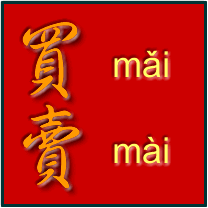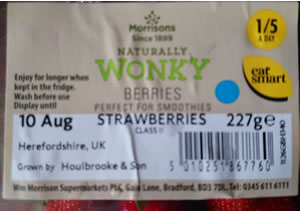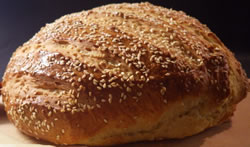
The words for to buy and to sell are very similar in Mandarin: 買 [买] (mǎi) [maɪ˦˩˧] = buy and 賣 [卖] (mài) [maɪ˥˩] = to sell. In Cantonese the characters are the same, but are pronounced maai5 [maːi˩˧] (buy) and maai6 [maːi˨] (sell) [source]. The only difference between them is in the tones, and they are easily confused by learners. Do native speakers ever mix them up?
The character 買 combines 网 (wǎng – net) and 貝 (bèi – shell, cowrie) [source], and 賣 combines those elements plus 出 (chū – go out), which became reduced to 士 (shì – soldier) over time [source].
If you put these two characters together: 買賣 [买卖] (mǎimài) it means business, shop, store or deal [source].
Do any other languages have words for buy and sell that are so similar?
Buying and selling both involve an exchange of goods or services. The only difference is in the direction of the exchange. I might sell something to you, or buy something from you, while you might sell something to me, or buy something from me.
The same is true of other pairs of words such as borrow and lend. The one you use depends on the direction of the exchange: I borrow from you, and you lend to me. Teach and learn are also similar: You teach me, and I learn from you, or I teach you, and you learn from me. Although in some varieties of English learn is used to mean learn and teach.
In Welsh the word dysgu means to learn and to teach, and benthyca means to borrow and to lend. The word addysgu, means to teach, but it isn’t used much in colloquial Welsh [source].
Are there any other languages that don’t make a distinctions like this?
Is there a linguistic term for word pairs like this?








